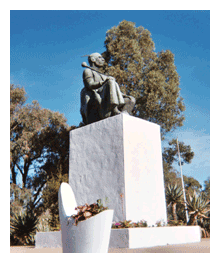|
EXPERIENCE LESOTHO: THE
MOUNTAIN KINGDOM
"COME AND VISIT THIS
BEAUTIFUL COUNTRY AND
BE CHALLENGED BY THE WONDERS OF
NATURE"
by David J. Saunders
 Lesotho
offers a truly unique vacation destination full of
adventures that will test your limits as you
experience breathtakingly beautiful and magnificent
views in an ideal place for eco-tourist and nature
lovers as well as outdoor sports enthusiasts.
Lesotho, affectionately known as the "Mountain
Kingdom in the Sky" is one of the few remaining
monarchies in Africa and for the local Basotho,
traditions are an integral part of their daily
lives. Accordingly, the "Ten Best Reasons to Visit
Lesotho" are: (a) opportunity to visit the
spectacular Drakensburg and Maluti Mountain Ranges;
(b) unspoiled and pristine natural beauty; (c) the
unbelievable opportunity to actually ski in Africa;
(d) opportunity to explore relics of a pre-historic
past; (e) unique pony trekking to remote villages;
(f) visit the Kome Cave Village &endash; once home
to cannibals; (g) experience traditional Basotho
villages in remote mountain villages; (h) visit the
Sani Top &endash; which is the highest pub on the
African continent; (i) see the impressive Katse Dam
which is the source of Southern Africa's watershed;
and (j) participate in the annual Roof of Africa
Rally &endash; which is an extreme off-road motor
cross challenge that is rapidly gaining in
popularity around the world. Lesotho
offers a truly unique vacation destination full of
adventures that will test your limits as you
experience breathtakingly beautiful and magnificent
views in an ideal place for eco-tourist and nature
lovers as well as outdoor sports enthusiasts.
Lesotho, affectionately known as the "Mountain
Kingdom in the Sky" is one of the few remaining
monarchies in Africa and for the local Basotho,
traditions are an integral part of their daily
lives. Accordingly, the "Ten Best Reasons to Visit
Lesotho" are: (a) opportunity to visit the
spectacular Drakensburg and Maluti Mountain Ranges;
(b) unspoiled and pristine natural beauty; (c) the
unbelievable opportunity to actually ski in Africa;
(d) opportunity to explore relics of a pre-historic
past; (e) unique pony trekking to remote villages;
(f) visit the Kome Cave Village &endash; once home
to cannibals; (g) experience traditional Basotho
villages in remote mountain villages; (h) visit the
Sani Top &endash; which is the highest pub on the
African continent; (i) see the impressive Katse Dam
which is the source of Southern Africa's watershed;
and (j) participate in the annual Roof of Africa
Rally &endash; which is an extreme off-road motor
cross challenge that is rapidly gaining in
popularity around the world.
The small mountainous Kingdom of Lesotho,
roughly the size of the State of Maryland in the
United States with a population of about 2.1
million, is entirely surrounded by South Africa and
its terrain has been likened to Switzerland.
Lesotho has one of Africa's most homogeneous
populations, consisting almost exclusively of
Basotho with English and Sesotho as the official
languages. In the 19th century, King Moshoeshoe I
brought together a number of splinter groups in
this mountainous stronghold, giving birth to the
Basotho nation. It was in reality a kingdom made up
of refugees from the fierce tribal wars in
neighboring regions.
 Top:
Photo of a small mountain that resembles the
national symbol of the Kingdom of Lesotho which is
in the shape of the "Basotho Hat". Top:
Photo of a small mountain that resembles the
national symbol of the Kingdom of Lesotho which is
in the shape of the "Basotho Hat".
Above: Statue of King Moshoshoe I, the Founder of
the Kingdom of Lesotho . Monument is located in
Maseru, the capital city.
Left: Mrs. Felleng Makeka, Chief Executive of the
Lesotho Tourism Development Corporation in her
office with Helen and David.
Through smart military and diplomatic
strategies King Moshoeshoe I managed to keep his
enemies at bay until challenged by the Boers who
had established their own Orange Free State
Republic alongside the kingdom and then started
making territorial claims. War ensued and fearing
the entire loss of the kingdom's territory, Lesotho
became a British Protectorate in 1884 until it
regained its independence on October 4, 1966.
Today, Lesotho is a constitutional monarchy with
King Letsie III as the Head of State with authority
vested in the Prime Minister of the majority
political party. Currently, the Honorable Pakalitha
Mosisili is the Prime Minister (elected in 2002)
under the Lesotho Congress for Democracy
(LCD).
Interesting Places to Visit while in Lesotho
include the following: Major towns and cities
&endash; Maseru, Lesotho's capital which is also
known as the "place of red sandstone". Its
landmarks include the Basotho Hat Craft Center with
its upstairs restaurant and the large Basotho
Shield. The Moteng Weavers and Seithati Weavers are
also worth visiting while in Maseru; Teya-Teyaneng,
often referred to as "TY", which is the crafts
capital of Lesotho. Here beautiful woven wall
hangings, tapestries and jerseys are made by the
local craftswomen; Butha-Buthe, founded in 1884, is
the last major town before the start of the Lesotho
Highlands. The town was the first mountain fortress
for the Basotho and it was here in the Maluti
Mountains that they fled from the Zulu King Shaka
in the 19th century. Liphofung Cultural Village is
also housed here as well as the Mahlasela Ski
Slope, which is one of the few places in Africa
where snow skiing is possible; Near the town of
Leribe Hlotse, close to the South African border
post, one can buy mohair scarves, Sotho blankets
and a variety of other handicrafts; The town of
Morija, in the Caledon Valley, at the foot of the
Makhoarane Plateau, is the location of the earliest
religious mission station and the only museum in
Lesotho &endash; the Morija Museum and Archives
&endash; which exhibits fascinating geological and
ethnographic materials and other interesting items
of historical and political relevance. It is also
the site of the annual Morija Arts and Cultural
Festival held every first week in October.
Major Tourist Attractions in Lesotho include
the following: Sehlaba-Thebe National Park, home to
the mountain buck, small mammals and birds as well
as a variety of Cape Alpine flora; the Katse Dam,
which is the second largest man-made dam in Africa
next to the Lake Volta Akosombo Dam located in
Ghana. This dam is part of the impressive Lesotho
Highlands Water Project, which was initiated in
order to supply much needed fresh water to Gauteng,
the main commercial province in South Africa; There
are also many water sports activities that can be
experienced by the adventurous visitor such as
fresh-water fishing, white water rapids boating,
kayaking, canoeing and small boat sailing; Other
points of interest include the Maletsunyane Falls
which are actually twice as high as the mighty
Victoria Falls and well worth seeing; Lesotho also
has more than four hundred ancient rock art sites
and a number of places where one can see two
hundred million year old fossilized dinosaur
footprints and fossilized wood. If your are
interested in viewing these, the Masitise Dinosaur
Track Way and Moyeni are two sites that should not
be missed; In addition, a number of local tour
operators offer pony trekking, year round hiking
opportunities, and 4X4 excursions to explore
waterfalls, San paintings and awe inspiring
scenery.
Interesting Things To Do while in Lesotho
include the following: Pony-trekking on locally
bred Basotho ponies is a very popular mode of
traversing the mountainous landscape and there are
various pony trekking associations throughout
Lesotho that will provide assistance with hiring
ponies and guides; Year-round mountain climbing,
hiking, mountain biking and 4X4 trails are ideal
ways to explore the Maluti and Drakensburg
Mountains, while skiing is popular between the
months of May and July; Para-gliding and
hang-gliding offer an opportunity to take in the
spectacular views of the countryside; In addition,
bird watching is also quite an enjoyable experience
with a wide variety of species to be seen. A
particularly interesting feature of Lesotho is that
you can spend a night in a Basotho village and
enjoy genuine Basotho hospitality which is steeped
in culture and traditions that are still evident in
the daily lifestyle of the Basotho people. In
addition, you will be pleasantly entertained with
the cultural songs of Basotho. Whether it is sung
by a group of women, men and/or children, it will
definitely capture your heart and imagination. For
the most part, the local people are warm and
hospitable. However as a matter of courtesy,
visitors should always pay their respects to the
local chief before visiting a village.
Travel Details: The climate in Lesotho is
generally temperate with summer from November to
February which is hot and winter from June to
August which range from cool to cold. Rain occurs
mainly between the months of March and November and
snow falls on the highest peaks during the winter.
Casual wear is appropriate during the summer months
and in winter, jerseys and jackets are advisable.
There are good medical facilities in the main towns
but it is advisable to bring your own medical kit
and any required medication for the duration of the
stay. Malaria is generally not a problem in the
area and an international vaccination certificate
for inoculation against Yellow Fever is required.
Due to the higher altitude, a strong sunscreen and
the use of a hat or cap is also recommended. Visas
are not required for American citizens but all
visitors must have a valid passport and return
tickets. South African Airways is the most direct
way to get to Lesotho from the United States and
you can either fly there directly from
Johannesburg, South Africa for a two hour flight or
travel by road to Maseru, the Capital of Lesotho,
which is about a five hour drive from
Johannesburg.
For more information about visiting Lesotho,
please contact the Lesotho Tourism Development
Corporation (LTDC) at telephone: +266.22.312.427;
facsimile: +266.22.313.674; or e-mail address:
touristinfo@ltdc.org.ls. Also, please visit their
website at www.ltdc.org.ls. You can also contact
the Embassy of the Kingdom of Lesotho in
Washington, D.C. at telephone: (202) 797-5533 or
facsimile at (202) 234-6815 and the mailing address
is 2511 Massachusetts Avenue, Washington, D.C.
20008.
About the author: David J. Saunders is the
Chief Executive Officer of Venue International
Professionals, Inc. (VIP) which is an
African-American owned, full-service travel and
tourism company based in the Washington
Metropolitan Area specializing in travel and
tourism destinations to the Continent of Africa.
For more information about VIP or to discuss travel
and tour arrangements for visiting Lesotho, please
contact Helen C. Broadus, President of VIP at
1-877-TO-VENUE [TOLL FREE]; (301) 856-9188
[VOICE]; (301) 868-2218 [FAX];
vipinc@erols.com [E-MAIL]; and also visit
VIP's website at www.venuetravel.com.
|
